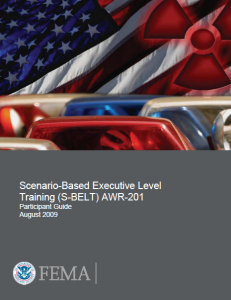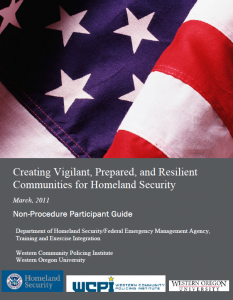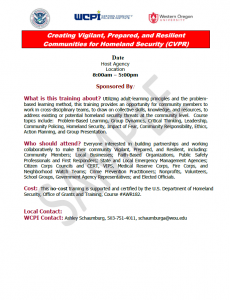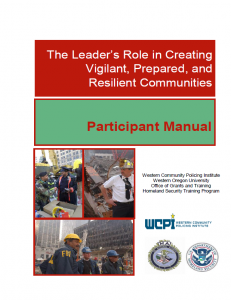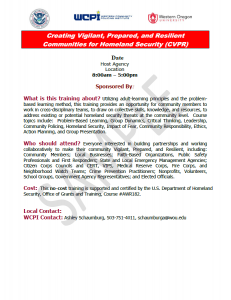Curriculum
Homeland Security Curriculum
Scenario-Based Executive Level Training (S-BELT)-
S-BELT Participant guide
S-BELT Sample Course Announcement
This course is created to expand and sustain homeland security leadership across the country. Presented by the Western Community Policing Institute, the course is designed to be challenge and scenario-based, requiring active participation and problem-solving. Participants, as leaders of their communities, will learn about leadership theories and traits that will assist them in planning and preparing for a National or domestic all hazards catastrophic event. This course will use historical figures and a pandemic influenza case study to examine and discuss how leaders, at critical times, can do the right thing, at the right time, in the right way, and for the right reasons.
This course is designed to provide “hands-on” practical training activities that lead to providing executives with the leadership skills needed in an “all-hazards” event. The course consists of six modules which are identified below. These modules include classroom instruction, real-life scenarios, and practical activities.
Creating Vigilant, Prepared, & Resilient Communities for Homeland Security (CVPR)-
CVPR Participant guide
CVPR Sample Course Announcement
Only with strong partnerships, enhanced networking capabilities, and organized community infrastructures can United States’ communities become vigilant, prepared, and resilient in the war on terrorism and other events of national significance. Whether security threats involve acts of terrorism or natural or man-made disasters, a community’s ability to become vigilant, prepared, and resilient depends upon the efforts/partnerships of law enforcement, governmental and non-governmental organizations, community members, and tribal members who are adequately trained and equipped. With the continued threat of terrorist attacks and other events of national significance, now more than ever, it is incumbent on every U.S. citizen to not become a burden in times of crisis. This two-day course is designed to provide law enforcement personnel, governmental and non-governmental organization representatives, and community members awareness-level information, as well as capacity building, that leads to creating vigilant, prepared, and resilient communities for homeland security and events of national significance. This course includes classroom instruction, problem-based learning strategies, and practical “hands-on” activities. Topics include: Problem-Based Learning technique and application, elements of group dynamics (including team building, leadership principles, and conflict resolution), community policing history and tenets, components of homeland security preparedness and response (including terrorism and fear considerations), community responsibility, ethics, vision development, and action planning.
The Leader’s Role in Creating Vigilant, Prepared, & Resilient Communities (TLR)
TLR Participant guide
TLR Sample Course Announcement
This one-day course is designed to increase public safety executives’ level of terrorism awareness and preparation skills to engage the community in all-hazards and anti-terrorism strategies through partnering with federal, state, and local agencies. Through this highly interactive training, public safety managers and executives will team up with other agency personnel to share strategies and successes. Using a practica and real-life scenario, participants will identify community resources to be deployed in a real terrorist incident, natural disaster, or any event of national significance. In this course, participants will: Learn about Federal, state, and local anti-terrorism and homeland security resources, determine the preparedness needs of their jurisdiction, identify specific goals for higher levels of community preparedness in their jurisdictions, identify community partners who will assist in identifying and addressing preparedness gaps, use an implementation model to prepare an action plan, and evaluate methods to achieve identified goals for their jurisdiction. Upon course completion, participants will have developed an initial plan for addressing anti-terrorism and all-hazards issues of vigilance, preparedness, and resiliency.

